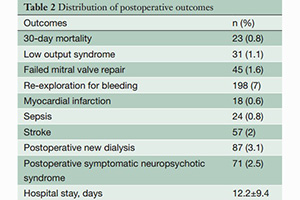Minimally-invasive mitral valve surgery: “The Leipzig experience”
Abstract
Background: Minimally invasive mitral valve surgery has become a routine procedure at our institution. The present study analyzed the early and long-term outcomes of patients undergoing minimally invasive mitral valve surgery over the last decade, with special focus on mitral valve repairs (MVRp).
Methods: The preoperative variables, intraoperative data and postoperative outcomes of patients undergoing minimally invasive mitral valve surgery were prospectively collected in our database from May 1999 to December 2010. The survival and freedom from reoperation were evaluated with life tables and Kaplan-Meier analyses.
Results: A total of 3,438 patients underwent minimally invasive mitral valve surgery, of which 2,829 were MVRps and 609 were mitral valve replacements (MVR). Forty-five patients (1.6%) required MVR due to failure of repair. The mean age was 60.3±13 years. More than a third of patients underwent concomitant procedures like tricuspid valve surgery, atrial septal defect (ASD) closure and cryoablation. The rate of conversion to sternotomy was less than 1.4%. The 30-day mortality was 0.8%. The 5- and 10-year survival of all patients (MVR and MVRp) undergoing minimally invasive mitral valve surgery was 85.7±0.6% and 71.5±1.2%, respectively. For MVRp, the survival was 87.0±0.7% and 74.2±1.4% at 5 and 10 years, respectively. Freedom from reoperation was 96.6±0.4% and 92.9±0.9% at 5 and 10 years, respectively.
Conclusions: Minimally invasive MVRp can be performed safely and effectively with very few perioperative complications. The early and long-term outcomes in these patients are acceptable.
Cover






